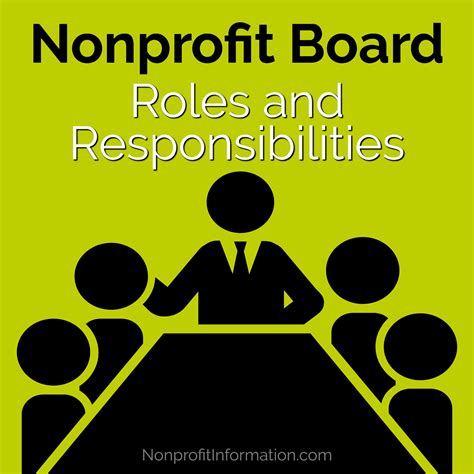In today's philanthropic landscape, serving on a nonprofit board can be a highly rewarding experience for individuals looking to make a meaningful impact. Not only does it provide an opportunity to contribute to a cause you're passionate about, but it also allows you to develop new skills, expand your professional network, and enhance your community engagement. If you're eager to apply for a nonprofit board position, here are five ways to get started:
Serving on a nonprofit board can be a highly rewarding experience for individuals looking to make a meaningful impact.

Understand the Responsibilities of a Nonprofit Board Member
Before applying for a nonprofit board position, it's essential to understand the responsibilities involved. As a board member, you'll be expected to:
- Attend regular board meetings and contribute to discussions
- Provide strategic guidance and oversight
- Support fundraising efforts and help secure resources
- Ensure the organization's financial health and sustainability
- Advocate for the organization's mission and values
If you're still interested in pursuing a nonprofit board position, here are five ways to apply:
1. Leverage Your Professional Network
Utilize your professional network to explore potential board opportunities. Reach out to colleagues, friends, and acquaintances who are already involved with nonprofits, and ask if they know of any organizations looking for new board members. You can also attend industry events, conferences, and job fairs to connect with people in the nonprofit sector.
2. Search Online Board Listings
Websites like LinkedIn, VolunteerMatch, and Idealist often list nonprofit board positions. You can also search for specific organizations or causes you're interested in and check their websites for board openings. Additionally, many state and local governments have websites that list nonprofit board vacancies.

3. Reach Out to Nonprofit Organizations Directly
If you're interested in a specific nonprofit organization, don't be afraid to reach out to them directly. Visit their website, review their mission and values, and look for contact information for their board or leadership team. Send a tailored email or letter expressing your interest in serving on their board, highlighting your relevant skills and experience.
4. Consider Board Training and Development Programs
Many organizations offer board training and development programs designed to prepare individuals for nonprofit board service. These programs can provide valuable insights into nonprofit governance, fundraising, and leadership, making you a more competitive candidate for board positions.
5. Highlight Your Relevant Skills and Experience
When applying for a nonprofit board position, be sure to highlight your relevant skills and experience. Tailor your resume and cover letter to showcase your:
- Relevant work experience, including leadership and management roles
- Volunteer experience, including any nonprofit board service
- Education and training, including degrees and certifications
- Skills, including financial management, marketing, and fundraising
By following these five ways to apply for a nonprofit board position, you can increase your chances of landing a role that aligns with your passions and values. Remember to stay persistent, patient, and open-minded throughout the application process.
Benefits of Serving on a Nonprofit Board
Serving on a nonprofit board can have numerous benefits, including:
- Developing new skills and expertise
- Expanding your professional network
- Enhancing your community engagement and reputation
- Contributing to a cause you're passionate about
- Gaining leadership and governance experience
Challenges of Serving on a Nonprofit Board
While serving on a nonprofit board can be highly rewarding, it also comes with challenges, including:
- Time commitment, including attending meetings and events
- Financial responsibilities, including fundraising and budgeting
- Governance and oversight responsibilities, including ensuring compliance with laws and regulations
- Managing conflicts of interest and ensuring accountability
- Balancing competing priorities and stakeholder interests
Gallery of Nonprofit Board Positions





FAQs
What are the typical responsibilities of a nonprofit board member?
+Typical responsibilities of a nonprofit board member include attending regular board meetings, providing strategic guidance and oversight, supporting fundraising efforts, ensuring the organization's financial health and sustainability, and advocating for the organization's mission and values.
How do I find nonprofit board positions?
+You can find nonprofit board positions by leveraging your professional network, searching online board listings, reaching out to nonprofit organizations directly, considering board training and development programs, and highlighting your relevant skills and experience.
What are the benefits of serving on a nonprofit board?
+The benefits of serving on a nonprofit board include developing new skills and expertise, expanding your professional network, enhancing your community engagement and reputation, contributing to a cause you're passionate about, and gaining leadership and governance experience.
Final Thoughts
Serving on a nonprofit board can be a highly rewarding experience that allows you to make a meaningful impact in your community. By understanding the responsibilities of a nonprofit board member, leveraging your professional network, searching online board listings, reaching out to nonprofit organizations directly, and highlighting your relevant skills and experience, you can increase your chances of landing a nonprofit board position that aligns with your passions and values.
